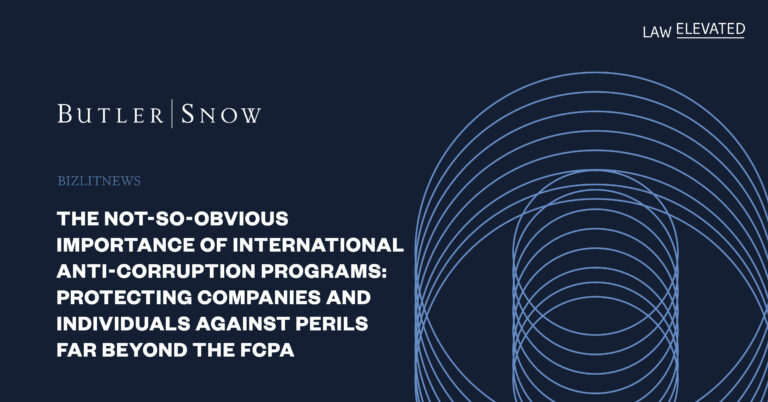I remain amazed at the consistently-high estimates of the percentages of U.S. companies doing business internationally, which do not have FCPA and related anti-corruption policies and programs. Beyond the obvious and perennially-touted importance for all U.S. companies— both public and private—to maintain real, substantive compliance policies, procedures, training and cultures of compliance, in order to avoid violations of the U.S. Foreign Corrupt Practices Act (and similar albeit even more onerous laws such as the UK Bribery Act), is the equally important need for every U.S. company to protect itself and its people from civil and criminal exposure under the panoply of growing anti-corruption and other applicable laws of countries across the globe.
What this means is that in addition to the growing consensus that corruption is corrosive and dangerous, there is an undeniable trend across a broad range of developed and developing countries to enact anti-corruption laws—which are often broader in their proscriptions than the FCPA, and often with fewer or no exceptions. Therefore, one of the compelling messages we stress for our U.S. client companies doing business overseas is the obvious need to scrupulously comply with U.S. law, and beyond that, the absolute need to fully understand, and provide training and guidance on the relevant laws of every country in which those entities conduct business. As we put it succinctly—conduct constituting a bribe within the meaning of the FCPA (e.g., providing of money, entertainment, travel or other benefits disguised legitimate payment for services, etc.) is increasingly likely to violate the laws of the host country as well.
In a case of an internal discovery of errant conduct by company personnel—coupled with the company’s self-reporting, cooperation, remediation and evidencing a history/culture of compliance—a smart U.S. company has the ability to, under the right circumstances, secure a favorable resolution and avoid sanctions and other negative outcomes altogether. However, in those instances in which the conduct (or even alleged conduct) is discovered by or reported to local or national law-enforcement authorities in those foreign countries, the calculus of survival in terms of avoiding very negative consequences can change drastically. Our U.S. company and its individual personnel can, in such cases be confronted with broad, ill-defined, arcane laws with little or no due process protections to speak of. Add to that complex landscape the broad panoply of laws of various countries around the globe, addressing issues and with consequences potentially far more challenging, including (at least, in one case) a rapidly-expanding definition of activities allegedly (and subjectively) constituting “espionage”.
Approximately one year ago, the Peoples Republic of China enacted and put into effect a broadened anti-espionage law and with it, demonstrated their willingness to use it against both individuals and organizations doing business there. In essence, that law permits Chinese authorities to bring to bear instantaneous sanctions against both foreign and Chinese national companies and individuals— including business closures, detentions, (including both deportations and exit prohibitions) and large fines (not to mention criminal prosecution and prison sentences in some cases) if the government deems any of their conduct to pose a potential national security risk. Most chilling is the fact that the broad provisions of these laws can be enforced against what we consider normal—otherwise perfectly legal—business activities, including market and business research and even collection of financial data in the carrying out of due diligence investigations—which themselves are central to anti-corruption processes. The application and use of this law, as well as the government’s application of it to exact large fines, was significant enough to trigger a warning to U.S. entities doing business in China by the Director of National Intelligence (CIA). The goal of a U.S. company’s scrupulously building, maintaining, observing and enforcing its strict anti-corruption policies must carry with it the willingness and ability of each company to thoroughly research, analyze and understand the potential legal exposure which it and its people may risk in every country in which it does business.
